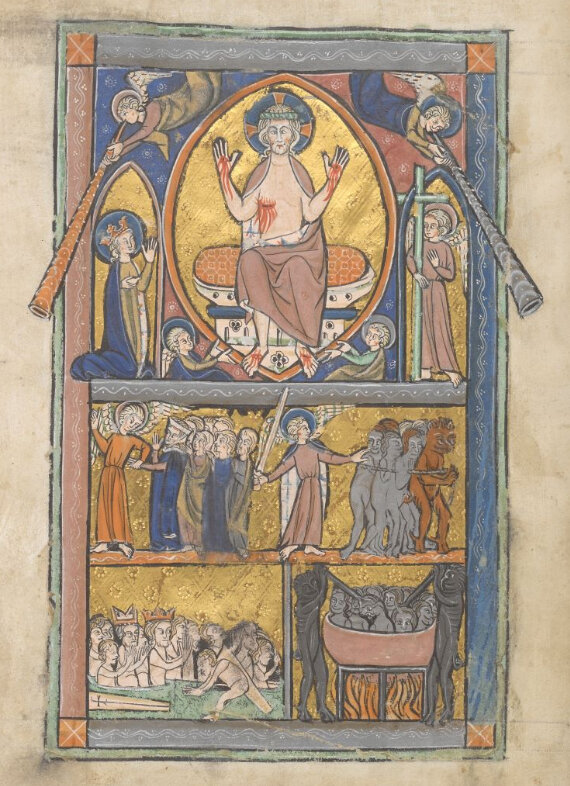5 May 2021
The word doom comes down to us from the Old English dom, although the primary meaning has shifted over the centuries. Today, doom usually means an unpleasant fate; one can be doomed to a life of loneliness, but one is hardly ever doomed to a life of bliss. But in Old English, the word simply meant a judgment, and that judgment could be either legal or divine.
For instance, the law code promulgated by King Alfred in the late ninth century has this:
Dem ðu swiðe emne. Ne dem ðu oðerne dom þan welegan, oðerne ðam earman; ne oðerne þam liofran & oðerne þam laðran ne dem ðu.
(Judge very equally. Do not pronounce one doom for the wealthy, another to the poor, not one for the beloved and another for those whom you hate.)
The verb in this passage is deman, which survives as our present-day to deem. Deman and deem have the same root as doom. But with one exception, doom was not used as a verb in Old English. That one exception is the verb domian, which only appears in the poem Daniel, a versification of a portion of that biblical book. In that context domian means to glorify God, literally to judge God in one’s heart.
And the famous Doomsday Book compiled during the reign of William the Conqueror has nothing to do with the Apocalypse; it is simply an accounting of judgments regarding who owns what in the kingdom.
But the Old English dom could also be used in the context of the end of days. From the Old English translation of Gregory the Great’s Pastoral Care, a translation that likely was done by King Alfred himself, probably with the assistance of tutors:
Ðonne cymð se dryhtnes domes dæg & wrace dæg ofer ða truman ceastra & ofer ða hean hwammas, Ðonne ðæt ierre ðæs ytemestan domes ða menniscan heortan towyrpð, ða ðe nu sindon betynede & getrymede mid lytelicum ladungum wið ða soðfæsðnesse, & arafað ðæt cliwen ðære twifaldan heortan.
(Then comes the Lord’s day of doom and the day of vengeance for the strong fortresses and the high regions, when the final doom destroys the human hearts, which now are closed and fortified with cunning excuses against the truth, and unravels the snarl of the deceitful heart.)
But when referring to the Apocalypse, the word dom itself still only meant judgment. It is the context or modifiers that give it the specific meaning, as in se dryhtnes domes dæg, or the Lord’s day of judgment, or as in the above passage ytemestan domes or final judgment
In Middle English, we start seeing the specific sense of the Last Judgment without modifiers, although the word still basically meant simply judgment. From the A-Text of William Langland’s poem Piers Plowman, written in the latter half of the fourteenth century:
At þe dredful dom, whanne dede shal arisen
And come alle before Crist accountes to ȝelden—
How þou leddist þi lif here and his law keptest,
And how þou dedist day by day þe dom wile reherce.
A pokeful of pardoun þere, ne prouincialis lettres,
Þeiȝ þou be founde in þe fraternite of alle þe foure ordris,
And have indulgence doublefold—but Dowel þe helpe,
I ne wolde ȝiue for þe patent of þi pardoun on pye hele!(At the dreadful doom, when the dead shall arise
And all come before Christ to pay their accounts—
How you lead your life here and keep his law,
And how you act day by day will recite your doom,
A sack of pardons there, nor provincial letters,
Those that you can find in the fraternities of all the four orders [of friars],
And have indulgences two-fold—but Do-Well will help you,
I would not pay for the document of the pardon on your pious salvation!)
Eventually, the apocalyptic sense drove out the basic sense of doom, and that became the primary meaning. That basic sense was replaced by the Anglo-Norman jugger (to judge) and judgement.
Sources:
Dictionary of Old English: A to I, 2018, s.v. dom, n. domian, v., deman, v.
Langland, William. Piers Plowman: A Parallel-Text Edition of the A, B, C and Z Versions, vol. 1. A.V.C. Schmidt, ed. London: Longman, 1995, A.8.172–79, 353. HathiTrust Digital Archive. Cambridge, Trinity College MS R.3.14.
Liebermann, F. Die Gesetze der Angel Sachsen, vol. 1 of 3.. Halle: M. Niemeyer, 1903, Ælfred § 43, 40. HathiTrust Digital Archive.
Middle English Dictionary, 2019, s.v. dom, n., domen, v.
Oxford English Dictionary, second edition, 1989, s.v. doom, n., doom, v., deem, v.
Sweet, Henry. King Alfred’s West-Saxon Version of Gregory’s Pastoral Care, vol. 1 of 2. Early English Text Society O.S. 45. London: Oxford UP, 1871, 245. HathiTrust Digital Archive.
Image credit: The Huth Psalter. London, British Library, Add MS 38116, fol. 13v. Public domain in the United States as a mechanical reproduction of a work of art that was produced before 1925.

